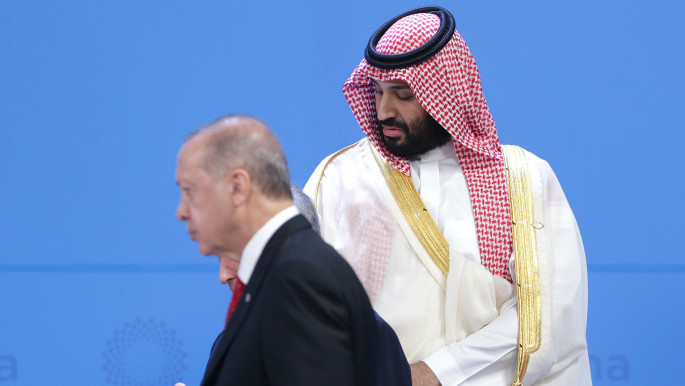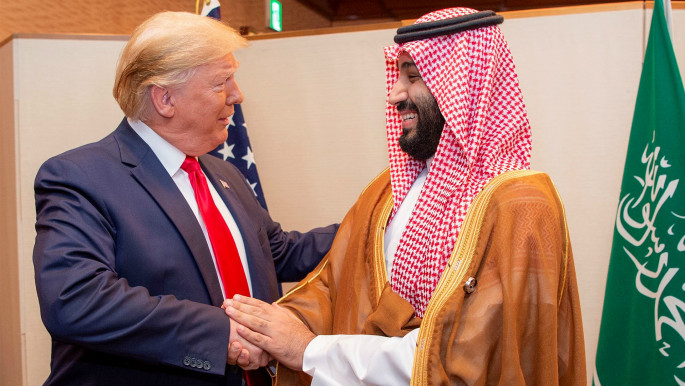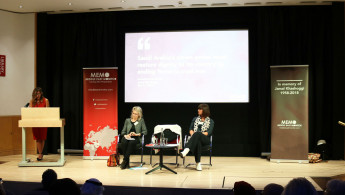#RememberingJamal: A raw account of Khashoggi's life, legacy and work
On the anniversary of the death of Saudi journalist Jamal Khashoggi, Middle East Monitor hosted an event at London's British Library honouring his life and legacy.
As opposed to focusing on Khashoggi's death and the gory details surrounding the Saudi regime's heinous crimes, the event placed much emphasis on Khashoggi's work, his life and the impact his life and death had across the world.
Last year, Khashoggi, a prominent Saudi journalist and writer for Washington Post was murdered in the Saudi consulate in the Turkish city of Istanbul when he went to get necessary documents to marry his Turkish fiancée Hatice Cengiz.
He was tortured and strangled to death and then was dismembered. Initially, Riyadh denied all responsibility of Khashoggi's death, even turning off all cameras in the consulate that day and fabricating CCTV evidence of him leaving the consulate.
They later proceeded to say "rogue killers" in the Saudi embassy murdered him.
 |
|
| Read also: 'A real friend speaks bitter truths': Khashoggi's murder casts a dark shadow on Turkey-Saudi relations |
But last Thursday Saudi Arabia's Crown Prince Mohammed bin Salman alluded to his own responsibility for the murder in a new documentary, telling US television it "happened under my watch", but denied having any prior knowledge of the killing.
The event discussed the inconsistencies with Saudi Arabia's story and how it feeds into a wider context of human rights abuses coming out of Riyadh that led to their perceived immunity when carrying out this botched operation.
The event was introduced and chaired by Victoria Brittain, a former Guardian journalist and a consultant to the United Nations. She made an emotional tribute to his life, saying those who knew him and worked with him still felt like colleagues of his even a year after his tragic passing.
She emphasised that his killing did not happen in a vacuum. Brittain remembered the political prisoners still arrested in Saudi Arabia, including Loujain al-Hathloul who fought for women's right to drive in the kingdom and has been tortured behind bars.
"The law is not optional, not optional for anyone today," she warned addressing Saudi Arabia.
Unforgettable legacy
Sarah Leah Whitson, lawyer and executive director of Human Rights Watch's Middle East and North Africa Division then gave an acknowledgement of his work, with unique personal stories about him to mark his legacy. She was a friend of Khashoggi and was among the first to urge him to leave Saudi Arabia when he was banned from writing in December 2016.
She described Khashoggi as a man "committed to expanding knowledge, freedom and critical thought" across the Middle East whose life was in danger not because of being a part of any particular opposition, but because of the principles he represents.
When they were discussing his eventual departure from Saudi Arabia, Whitson said Khashoggi was particularly hurt at the thought of leaving his home. She recalled him showing her photos of his children and grandchildren that he risked never seeing again if he left. Eventually, he left because he "sought freedom to speak his views".
She regularly referenced his work, especially an article titled Saudi Arabia wasn't always this repressive. Now it's unbearable for the Washington Post upon his exile.
What's peculiar about Khashoggi's case was that he wasn't even an opposition figure, Whitson explained. In many cases, he was supportive of the Riyadh establishment, even initially supporting the war on Yemen thinking it was necessary to contain a perceived Iran proxy across his border.
'Bin Salman could go to jail'
Whitson then spoke about Saudi Arabia, describing the kingdom as being under the control of a young man whose thirst for power is unbounded: Mohammed bin Salman.
Despite the Saudi regime always having a heavy hand on its people, under previous monarchies, the situation wasn't as dire, Whitson explained.
Under the previous monarchy, despite perpetrating human rights abuses, society was more outspoken under King Abdullah.
"Today the crown prince exercises more power over the Saudi people than any other Saudi king before him," she said, warning that things will only get worse as time passes.
"There will be no role for civil society in decisions which concerned them," she added.
She added bin Salman admitting to some responsibility over the Khashoggi murder was a way to absolve him from his own personal responsibility and was merely a way to quieten criticisms surrounding him personally.
"Bin Salman won't ever accept personal responsibility because that would simply mean he would go to jail," she told The New Arab.
'He's my friend'
Later, British journalist Sue Turton discussed Khashoggi's death as something that did not reveal anything new about Saudi Arabia and only highlighted the systematic repression going on in the country.
She spoke of the war on journalists that Arab regimes have waged and how silence is complicity in such heinous crimes against press freedom.
"For evil to happen we need good men and women to do nothing. Or indeed, powerful men to handshake the men who kill," she said.
 |
|
| Read also: Is Saudi-US relationship 'too important and too strong' to be impacted by Khashoggi's murder? |
From the war on Yemen, to a domestic crackdown on human rights, international powers were at most silent on bin Salman's atrocities, which partially led to Khashoggi's tragic end. After he was murdered, world powers continued to turn a blind eye, putting yet more people at risk, Turton urged.
"In the end, what was Trump's reaction? He turned a blind eye to MbS's crimes," she said, using an acronym for bin Salman.
"Trump didn't take any notice of the UN report which said that MbS ordered the killing of Jamal. In fact, Trump said 'MbS is a friend of mine, he's going tremendous job.'"
Without emphasising the gruesome details of his murder, the Remembering Jamal event gave a raw account of Khashoggi's life, legacy and work.
Without drowning the audience with the politics surrounding Khashoggi's death, the audience were given a solid contextual summary of what life is like for journalists, activists and civilians within the region as Western governments enable power-hungry despots to build a dystopia.



